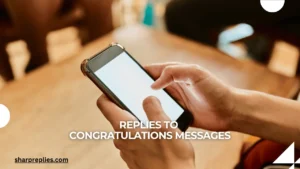Have you ever been on the receiving end of a heartfelt well-wish, only to feel unsure of how to respond? Whether it’s a birthday greeting, a congratulations message, or someone wishing you good luck for an upcoming challenge, responding to well-wishes can sometimes feel like an art.
The way we respond to others’ good intentions can reflect our emotional intelligence, our gratitude, and even our social awareness. But why does this matter?
In our fast-paced world where interactions can feel transactional, taking a moment to acknowledge well-wishes with sincerity can deepen connections and make both you and the person extending the wish feel valued.
This article will explore how to respond to well-wishes in various situations—be it for personal milestones, celebrations, or general support. From the simple and polite “thank you” to more thoughtful responses, understanding how to reply can help you navigate social interactions with grace and authenticity.
In the end, how we respond to well-wishes speaks volumes about our character and the relationships we wish to cultivate. So, let’s dive into the different approaches and nuances of replying to well-wishes and explore how to make every response meaningful.
Contents
- 1 The Power of a Simple “Thank You”
- 2 Adding a Personal Touch: Making It Meaningful
- 3 Responding to Well-Wishes in Professional Settings
- 4 When to Go Beyond a Simple “Thank You”: Acknowledge the Effort
- 5 Responding When You Don’t Feel Like It: Navigating Difficult Emotions
- 6 Conclusion:
- 7 FAQ’s
- 7.0.1 What’s the best way to respond to someone wishing me good luck?
- 7.0.2 How should I respond to birthday wishes from a colleague?
- 7.0.3 How do I respond if I don’t feel like celebrating?
- 7.0.4 Should I always personalize my responses to well-wishes?
- 7.0.5 How do I respond to someone who wishes me well during a difficult time?
- 7.0.6 Is it rude to not respond to well-wishes?
The Power of a Simple “Thank You”
The most common and often simplest response to a well-wish is a grateful “thank you.” When someone extends their best wishes, it’s not only polite but also acknowledging the kindness behind their words.
While it may seem straightforward, saying “thank you” shows appreciation and is usually all that’s needed in most situations.
For example, when someone wishes you a happy birthday, a simple “Thank you so much! I’m having a great day” conveys your appreciation without overcomplicating things. It is a universally accepted response that requires little effort but still conveys warmth and acknowledgment.
In many situations, particularly in casual or social contexts, this straightforward answer is often more than enough.
However, there’s more to replying to well-wishes than just saying “thank you.” Sometimes, a personal touch can enhance the exchange, creating a more memorable moment for both you and the person extending their good wishes.
Adding a Personal Touch: Making It Meaningful
Sometimes a more personalized response can strengthen the connection between you and the person offering well-wishes. While “thank you” is important, it can feel impersonal if you don’t add a little something more.
Adding a brief follow-up or showing curiosity about the well-wisher’s own life can create a richer conversation.
For instance, if someone congratulates you on a promotion, instead of just saying, “Thank you”, you could respond with, “I appreciate that! I’m really excited about the new role and the challenges ahead.
How have things been going on your end?” By doing this, you’re acknowledging their well-wish while also showing interest in them. This makes the exchange feel less one-sided and promotes deeper interaction.
The key is to show genuine interest in the person who is offering the well-wish. When you do so, it makes the interaction feel more authentic and less like a perfunctory exchange.
Even something as simple as, “Thank you for your kind words! I’m so grateful for your support” can take your response to the next level.
Responding to Well-Wishes in Professional Settings
In professional or more formal settings, responding to well-wishes may require a slightly different tone.
While a casual “thank you” may suffice in informal situations, in the workplace, you may need to balance gratitude with professionalism. A response that’s both appreciative and appropriate for the setting is important for maintaining positive relationships.
For example, if a colleague congratulates you on a promotion or achievement, your response might be, “Thank you, I’m really grateful for the opportunity and support from the team.
I’m looking forward to contributing even more in this new role.” This acknowledges the well-wish while also reinforcing your commitment to your work.
In professional environments, it’s important to also acknowledge the team effort or collective support that may have led to the success.
For instance, if someone wishes you good luck for a big project, you could reply with, “Thanks! I really appreciate it. I’m confident the team and I will pull it off.” This shows both humility and gratitude, as well as an awareness that your success is often the result of teamwork.
When to Go Beyond a Simple “Thank You”: Acknowledge the Effort
Sometimes well-wishes come with extra effort—a heartfelt card, a gift, or a meaningful gesture. When someone goes above and beyond to show their support, it’s essential to acknowledge that effort with a response that reflects the thoughtfulness behind it.
For example, if a friend sends you a thoughtful handwritten card for your birthday or a difficult achievement, responding with something like, “Thank you so much for the beautiful card! It really means a lot to me that you took the time to send it.
I feel truly blessed to have you in my life.” This response not only thanks them but also shows that you’ve noticed and appreciate the personal effort they put in.
When someone’s gesture is particularly meaningful, your response should match the level of care they extended. Going beyond a quick “thank you” in these situations helps you express your gratitude in a more heartfelt way and deepens the emotional connection between you and the person offering their well-wishes.

There may be times when receiving well-wishes feels difficult—perhaps you’re not in the mood to celebrate or are going through a personal challenge. During such times, responding authentically is still important, but you might need to express gratitude in a way that feels more aligned with your emotional state.
If someone wishes you well when you’re feeling down, a response like, “Thank you, I really appreciate your kind words right now” can convey both your gratitude and a sense of vulnerability. It’s okay to acknowledge that you’re not feeling your best but still appreciate the support.
In situations where well-wishes are overwhelming, such as during a time of grief or loss, it’s okay to respond simply and with a little more humility, like, “Thank you for your thoughts.
It means a lot to me.” There’s no need to feel pressured to celebrate if you’re not in the mood. In these situations, a simple, honest response is the best way to handle the situation.
Conclusion:
Responding to well-wishes is an opportunity to cultivate meaningful relationships, express gratitude, and connect on a deeper level.
Whether the well-wishes are casual or significant, how you respond can impact your emotional connections and shape how others perceive you. The key is to respond in a way that reflects genuine appreciation while also maintaining your authenticity.
From the simple “thank you” to more heartfelt replies, taking the time to acknowledge the kindness behind a well-wish not only reflects your own emotional maturity but also deepens your bonds with others.
Remember, responding to well-wishes is not just about words—it’s about showing respect for the person who has taken the time to extend kindness to you. So, the next time someone offers you a thoughtful greeting, take a moment to express your gratitude in a way that resonates with both you and the person on the receiving end.
FAQ’s
What’s the best way to respond to someone wishing me good luck?
A simple yet sincere response like, “Thank you, I really appreciate your support!” works well, but you can also tailor it based on the situation, such as, “I’m feeling confident and your support means a lot!”
How should I respond to birthday wishes from a colleague?
A professional but warm reply like, “Thank you so much! I appreciate your kind words,” keeps it appropriate and grateful in a workplace setting.
How do I respond if I don’t feel like celebrating?
It’s perfectly okay to reply with, “Thank you for your kind wishes, even though I’m not feeling quite up to it today.” Being honest and respectful of your feelings is key.
Should I always personalize my responses to well-wishes?
Personalizing your response is often appreciated, especially when the person went out of their way to offer their support. But a simple “thank you” works when you’re not sure what to say.
How do I respond to someone who wishes me well during a difficult time?
Acknowledge their kindness with, “Thank you for your thoughts, it really means a lot to me,” even if you’re not in a celebratory mood.
Is it rude to not respond to well-wishes?
Ignoring well-wishes can come across as ungrateful or dismissive. If you’re unsure how to respond, a simple, “Thank you” is a polite and appropriate reply.








